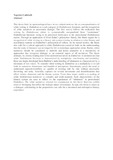Please use this identifier to cite or link to this item:
https://cris.library.msu.ac.zw//handle/11408/1858| Title: | Should I stay or should I go? : Zimbabwe's white writing, 1980 to 2011 | Authors: | Tagwirei, Cuthbeth | Keywords: | Literature, Zimbabwe, History and criticism | Issue Date: | 2014 | Publisher: | Stellenbosch University | Abstract: | This thesis finds its epistemological basis in two related motives: the re-conceptualisation of white writing in Zimbabwe as a sub-category of Zimbabwean literature, and the recognition of white narratives as necessarily dialogic. The first motive follows the realization that writing by Zimbabwean whites is systematically marginalized from “mainstream” Zimbabwean literature owing to its perceived irrelevance to the postcolonial Zimbabwean nation. Through an application of Even-Zohar’s polysystem theory, this thesis argues for a recognition of white writing as a literary sub-system existing in relation to other literary and non-literary systems in Zimbabwe’s polysystem of culture. As its second motive, the thesis also calls for a critical approach to white Zimbabwean narratives built on the understanding that the study of literature can no longer be left to monologic approaches alone. Rather, white narratives should be considered as multiple and hence amenable to a multiplicity of approaches that recognize dialogue as an essential aspect of all narratives. The thesis attempts, by closely reading nine white-authored narratives in Zimbabwe, to demonstrate that white Zimbabwean literature is characterized by multiplicity, simultaneity and instability; these are tropes developed from Bakhtin’s understanding of utterances as characterized by a minimum of two voices. To consider white writing in Zimbabwe as a multiplicity is to call forth its numerous dimensions and breadth of perceptions. Simultaneity posits the need to understand opposites/conflicts as capable of existing side by side without necessarily dissolving into unity. Instability captures the several movements and destabilizations that affect writers, characters and the literary system. These three tropes enable a re-reading of white Zimbabwean narratives as complex and multi-nuanced. Such characteristics of the literary system are seen to reflect on the experiences of “whiteness” in postcolonial Zimbabwe. The white narratives selected for examination in this thesis therefore exhibit crises of belonging that reflect the dialogic nature of existence. In sum, this thesis is meant as a dialogue, culminating in the proposition that calls for a decentred and redemptive literary experience. | URI: | http://scholar.sun.ac.za/handle/10019.1/95815 http://hdl.handle.net/11408/1858 |
| Appears in Collections: | Thesis |
Files in This Item:
| File | Description | Size | Format | |
|---|---|---|---|---|
| Tagwirei Cuthbeth.pdf | Abstract | 101.78 kB | Adobe PDF |  View/Open |
Page view(s)
48
checked on Jan 15, 2025
Download(s)
26
checked on Jan 15, 2025
Google ScholarTM
Check
Items in MSUIR are protected by copyright, with all rights reserved, unless otherwise indicated.


